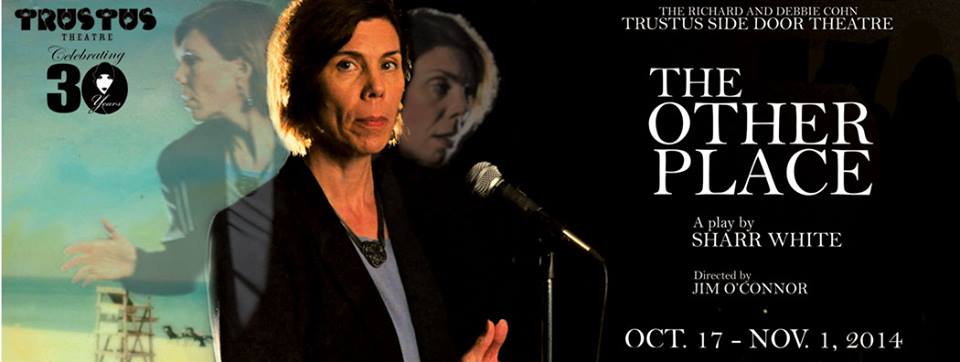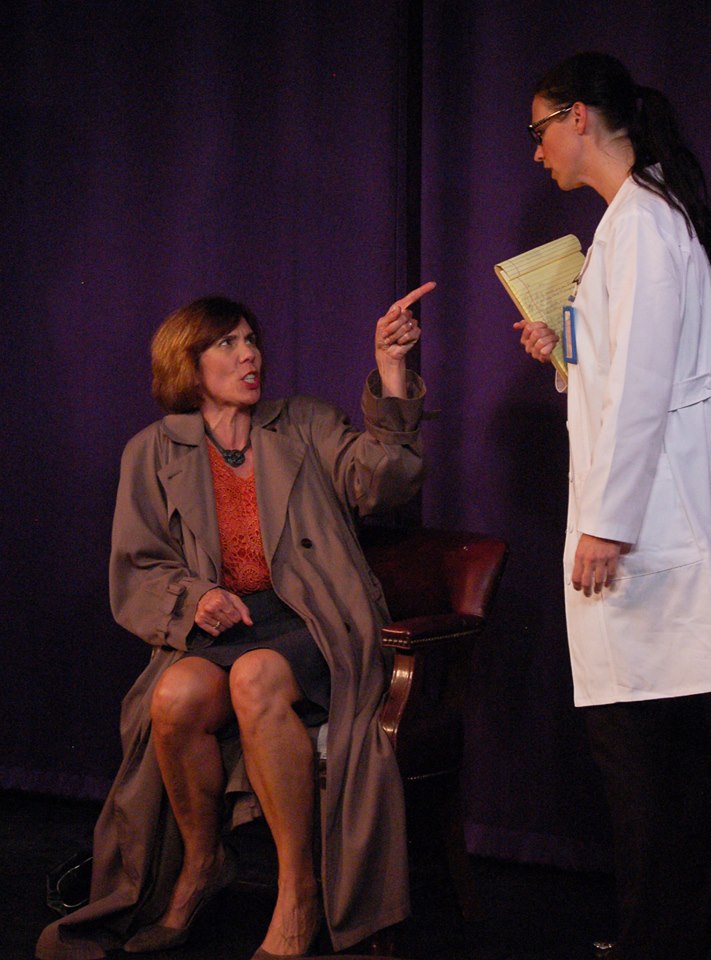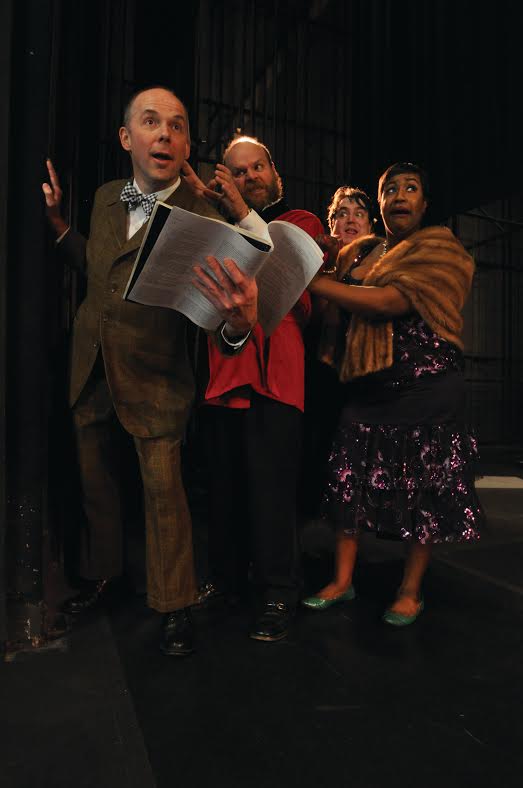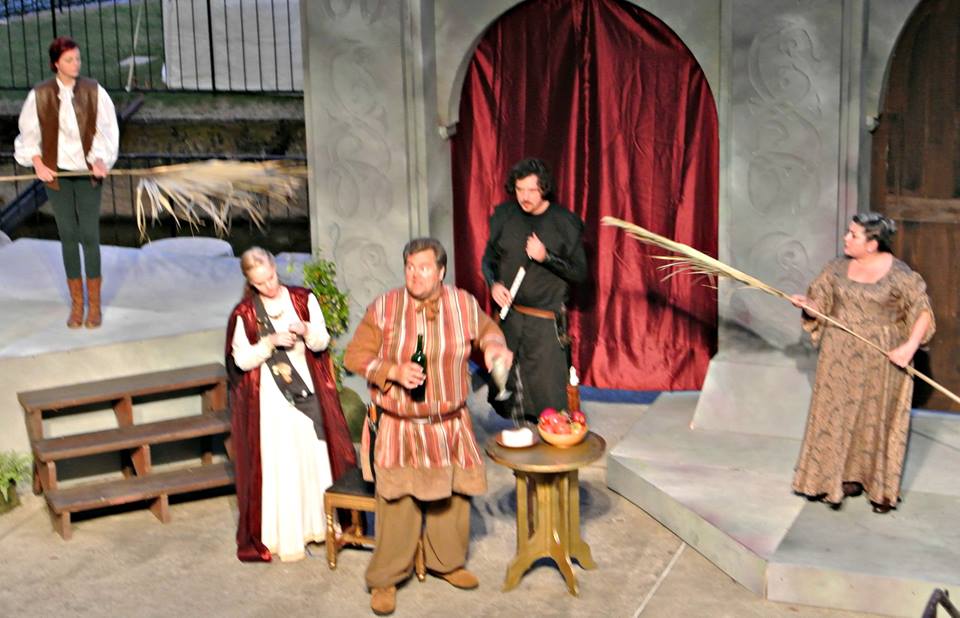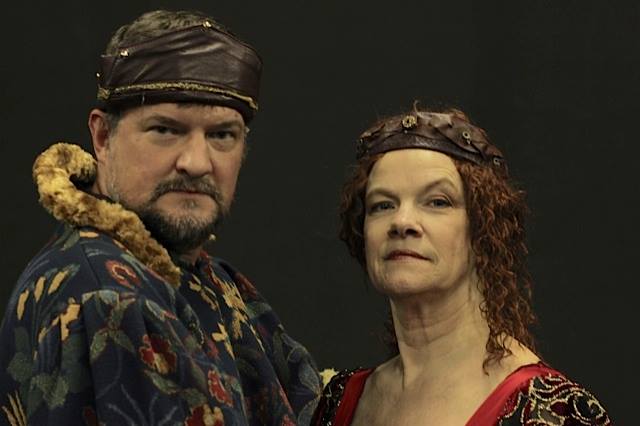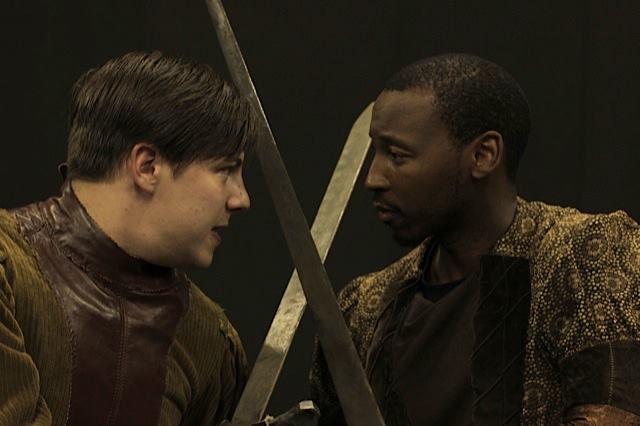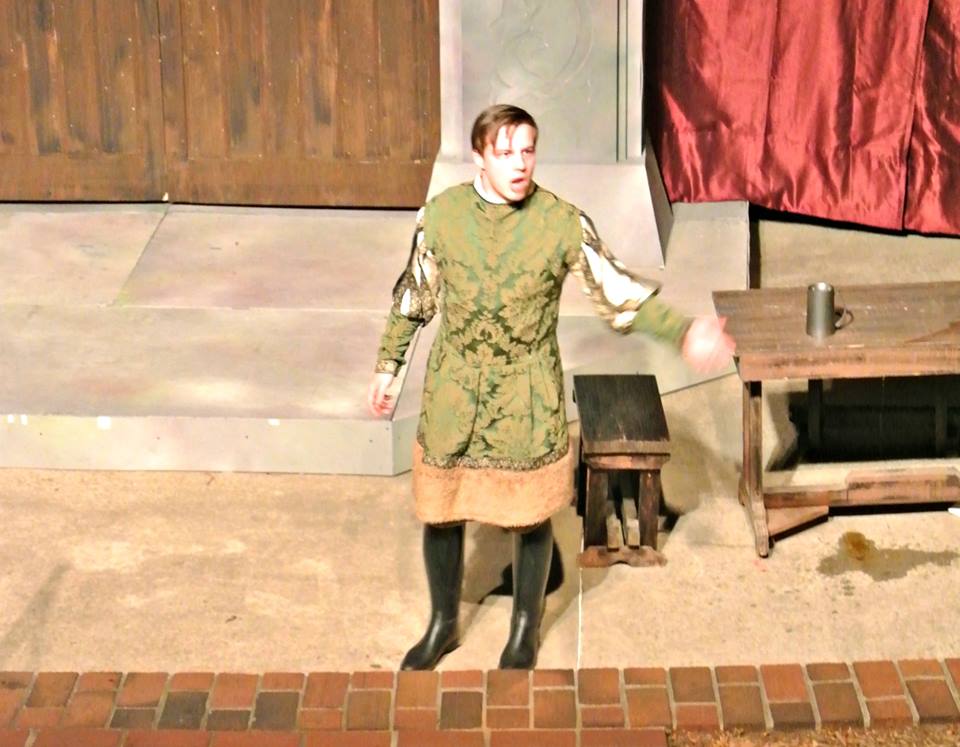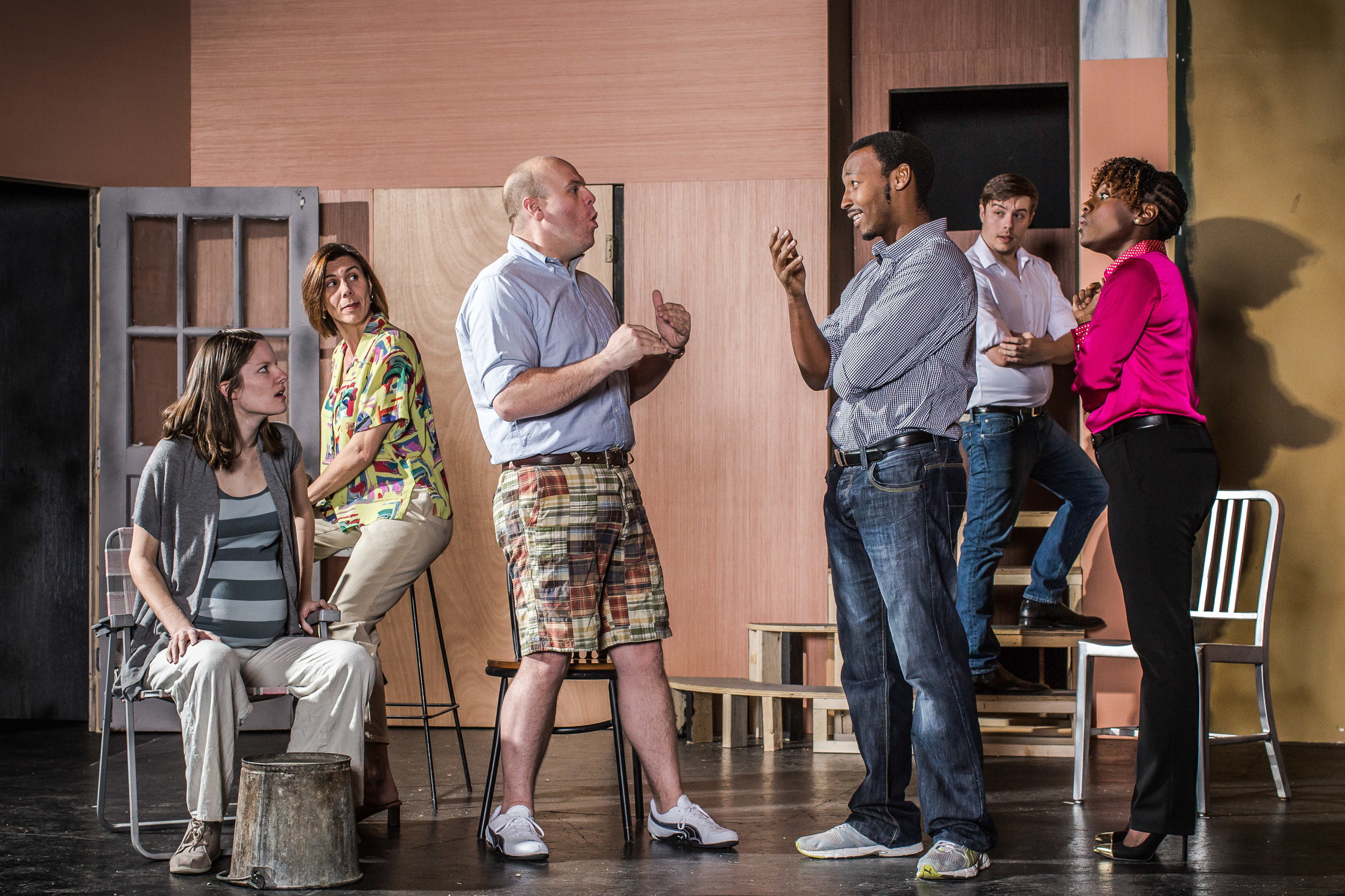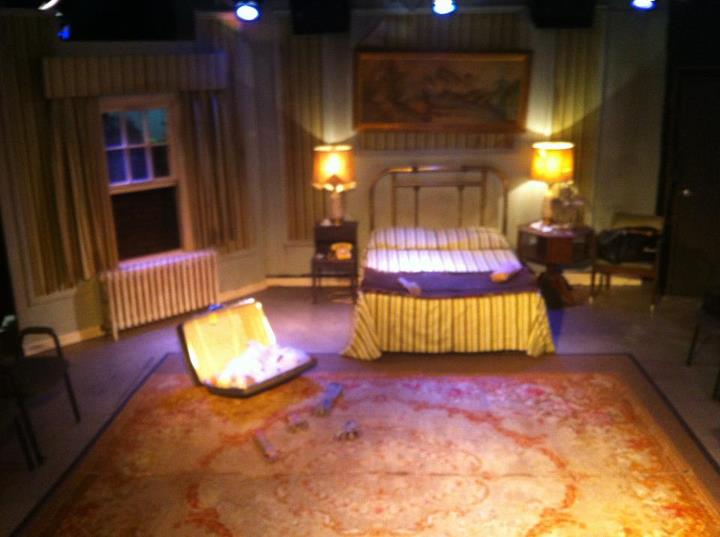
History repeats itself, according to Karl Marx, first as tragedy then as farce. I couldn’t help but think of this observation while watching The Velvet Weapon, a self-proclaimed farce purportedly inspired by the Velvet Revolution in former Czechoslovakia. I say purportedly because beyond a broadly construed theme of populism versus power, the play is philosophically incoherent, and it seems to trivialize the very historical moment to which it pays homage. I left the theatre still giggling at the performance (it was, at times, quite funny), but wondering why this play was the winner of the 2013 Trustus Playwrights’ Festival.
Premiering at Trustus last weekend, The Velvet Weapon is a new comedy by Deborah Brevoort. (For more about the playwright and the play, see the previous Jasper blog..) In the play, the audience at the National Theatre in an unnamed country protest a play being performed onstage and demand the performance of something different, “The Velvet Weapon,” a play by an unproduced playwright of questionable talent. According to pre-performance publicity, this play is supposed to be “a metaphorical examination of the Velvet Revolution,” the 1989 non-violent transition of power in Czechoslovakia led by students, political dissidents, and artists, which ended Communist rule. It is supposed to be about populist democracy. In the Free Times preview, Brevoort said some audiences had compared her play to the Occupy Movement. That’s a lot of heavy lifting for a really light play.
First, let me say that I love the Trustus commitment to new work. Let me say, too, that there was much to admire about this performance. The acting was mostly superb, and the actors did their heroic best to save the script. G. Scott Wild, in particular, was spectacular as Monsieur Le Directeur (aka Charlie), the pompous playwright, director, and dramaturg of the National Theatre. In one early scene he is backstage, wildly acting out his own play as it’s being performed onstage—histrionic, hilarious, perfect. Scott Herr as the amateur playwright Winston, Katie Mixon as usher and would-be actress Geraldine, and Libby Campbell-Turner as Winston’s mother also stood out, and Katrina Blanding and Hunter Boyle were hysterical stereotypes of backstage bitchiness. And John Taylor Kearns, with his series of broadly comic accents and absurd physical humor, was a goofy delight. Also, in a farce filled with slamming doors and rushed entrances and exits, the comic timing of the ensemble cast was spot on.

That said, I was surprised by some of the staging. The movement from first to second act is smart, the stage transformed over intermission from a backstage set to a stage-upon-the-stage, a set change that transformed us, the Trustus audience, into the dissatisfied audience in the fictional National Theatre. However, in a play that puts a proscenium stage onstage, that makes the audience part of the cast, and that stages two plays within the play, you really expect more interesting experiment with theatricality and staging. Only one entrance came through the audience—Kearns as Governor, at the end of the play. The lost opportunity here may be more a fault of script than direction, but in a play that claims to be about the power of art to blur the boundaries between theatre and life, that final weak attempt to break the fourth wall seemed (yawn) an empty gesture.

Further, when there was supposed to be crowd noise—or keys jingling (more about that in a moment)—I wanted more noise. Whether we were supposed to be hearing the rebellious audience on the other side of the stage in the first act or the rebellious citizenry outside the theatre, it sounded like maybe five people backstage. (The downpour Saturday night made more noise than that fictional roaring crowd.) I wanted the political uproar outside to more obviously impinge on the inside of the theatre. In a play in which the stage and the street are transforming each other, isn’t that the point?
Mostly, though, I just wanted a better play.
The problem isn’t that the play’s a farce, all mad pacing and hasty exits and someone caught with his (or her) pants down. There are moments of delightful silliness, and I laughed helplessly when a woman in a horse costume—a gag set up well in advance—galloped across the stage. With the mishmash of accents, plot non sequiturs, and that kitchen sink thrown onstage (a poke at theatrical realism?), there’s more than a little of the theatre of the absurd in this as well—perhaps Brevoort’s nod to the absurdist playwright Vaclav Havel, one of the leaders of the Velvet Revolution and the first democratically elected president of Czechoslovakia. Nor is the problem that it tries to do something serious. A good farce can make us laugh at serious things. I’m thinking here of Oscar Wilde’s The Importance of Being Earnest, or Brendan Behan’s The Hostage (a mad farce about deadly politics), or Nicky Silver’s wicked dark AIDS farce Pterodactyls (Trustus staged a smart production of this several years ago).
No, the problem isn’t that it makes the serious trivial or makes the trivial serious, but that it trivializes the very things it asks us to take seriously: art and revolution. Consider, for example, the jingling of keys. This was the symbol of the November 1989 demonstrations in Prague, crowds of people jingling their keys to ring out the old regime and signify the opening of locked doors. At the 20th anniversary in 2009, it became the emblem of the Revolution, and the gesture was revived by the crowds of mourners at Havel's funeralin 2011.
In the play, keys jingle weakly soon after Winston announces that he is “taking a stand for a different kind of theatre,” theatre as “an instrument of human liberty.” When the keys started tinkling beyond the stage doors in the play, I recognized the signature gesture of the revolution, but by the time I thought to pull out my keys and add some noise and solidarity, the moment had passed, the keys were gone, and we were into some incoherent interpretive blather from Winston about truth. That signature emblem was just a weak and passing gesture, a tossed-off reference—about as meaningful as a later allusion to Oz (“Josef, I don’t think we’re in the theatre any more!”) With all that heavy lifting in pre-performance publicity (we’re reminded, for example, that Brevoort traveled to Prague in 2005 and interviewed 43 leaders of the revolution), we’re asked to believe that the historical context matters. Instead we get the unbearable slightness of keys.
For Havel, we get Winston, that “playwright of questionable talent.” Winston says the national theatre is a “factory” for the production of plays that are filled with incoherence, obscurity, and “intellectual masturbation.” Pleasure, he says, has been replaced by seriousness—or pseudo-seriousness. He says the audience needs meaning—though his mother explains that that means his play is very entertaining. Winston’s play, “The Velvet Weapon,” has a cast of 700, an evil king and evil queen, a dragon—and hey, if someone wants to be a horse, then there’s a horse, too. After all, auditions are merely “rituals of the old power structure,” and his stand is more about opportunity than art. “I get to stand upon this stage,” he says to the audience, “and soon you will get to stand upon this stage, too”—both “the talented and the untalented.”
Winston’s nemesis is Monsieur Le Directeur, an elitist and snob who has written a Beckettian play about a hole in the stage. He thinks art should be protected from the masses. He complains about the “busload of housewives from the suburbs” that shows up for the matinee. He wants to win awards from the government (mostly to make his colleagues feel bad). His plays are filled with metaphors and syllogisms (a very very bad thing, we are led to believe); indeed, he himself spouts bad syllogistic logic. “The best works of art only appeal to the few,” he claims, so that the fact that the audience doesn’t like his play is proof that it is good.

Skewering pretention is funny. I love Beckett, but I rarely teach Waiting for Godot without first disarming my students by showing the Monsterpiece Theatre version of Waiting for Elmo. The central conflict here, however, is all stereotype and cliché—artists versus amateurs, elitism versus opportunity—language that reminds me of the hyperbolic and vitriolic discourse that surrounded the recent controversy over the North Carolina governor’s appointment of a self-published poet as the state’s poet laureate.
So bad art is good for the body politic, and good art is bad. And that play by Monsieur about the hole in the stage that we never get to see? Two people on a bare stage sounds like Beckett, but two people with a shovel standing over a hole is surely Shakepeare—Hamlet, to be precise, the gravedigger scene, one of the most important moments of syllogistic logic in English drama. (All men turn to dust, Hamlet says. Even Alexander the Great was a man, so he too turns to dust, nothing but a bit of clay to plug a beer barrel.) It’s surely no accident that Winston says when that play is performed, “the gravedigger wins.” Ironically, this aborted play is likely more akin to Havel’s absurdist drama than Winston’s heartwarming dragon epic.
To make things more confusing, despite the rhetoric of populism, the play never really knows where its politics lie. When the audience storms the stage Monsieur shouts, “You have to have talent to be up here.” The stage manager adds, “ You have to have a union card to come up there.” So, sure, this is about storming the barricades for access, but the audience that storms the stage really never insists that Winston’s questionable play go on. No, it’s foisted on us by his haranguing mother and ultimately by the Governor, who wants the play performed, then cancels it, then puts it back on. At the end, Winston’s play is finally and sketchily acted out as an allegory for the transfer of political power. The dragon lies down, the princess marries the prince, and everyone pledges to be nice to everyone else. Convicted by this play, the Governor gives up his crown, and Winston qua Havel is crowned Governor by the Governor (not elected president). The end.
So there’s bad art and good art, and good art is a tool of the totalitarian state, and bad art is the velvet weapon of the people, but the state demands the production of bad art in order to reinstate a different version of the state. This is a message play with a very confused message.
The fundamental problem in this fundamentally confused play is the insistent and incoherent transposition of the political and aesthetic, a mash-up of ideas that does a disservice to both. We are supposed to think that a clichéd and exaggerated battle between low art and high art is, in some important and meaningful way, analogous to the battle between populist democracy and totalitarian government. Historical emblems like the keys are reduced to empty gestures. For samizdat, we get a script thrown out the door. And for the Velvet Revolution, we get “The Velvet Weapon,” a play about a dragon—also a metaphor for revolution, also a metaphor for genitalia (when the embarrassed Winston holds his script in front of his crotch, the scantily clad Geraldine touches it, asking, “Is that the velvet weapon?”), and ultimately “a pledge to be nice to everybody.” So for a history of massive nonviolent political resistance we get the pledge to be nice, policemen smothered in kisses and a man who gives up his seat on the bus for an old woman. Honestly, if we’re in a world in which those in power are “struck down by sweetness,” that dragon onstage at the end really should be purple, not green. He is Barney..
I want to commend Trustus on the commitment to new work. Arts organizations need to take chances on new work and new artists. But give us a little credit as an audience. Just because it’s slapstick doesn’t mean we’ll like it. We are like that restless audience in the National Theatre: we want to be entertained, but really we’re hungry for meaning too. Trust us.
- Ed Madden
Photos courtesy of Rob Sprankle

Ed Madden is the literary arts editor of Jasper Magazine and the author of Nest.



